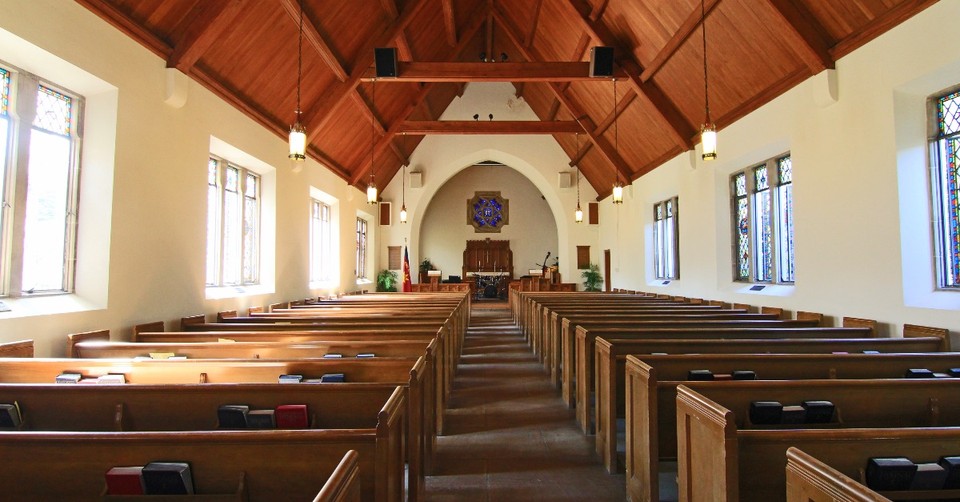5 Ways to Get the Most Out of Church

Since COVID, church attendance has drastically declined. When the pandemic hit, one in three practicing Christians stopped attending church. In 2020, for the first time in eight decades, church membership dropped to below 50% with the majority of Americans expressing no religious affiliation. Today, church services are experiencing only about 70% capacity—a far cry from the 91% who said they planned to return.
These numbers lead one to question the value placed on in-person church attendance. During the lockdown, we decluttered our calendars and to-do lists. Now, as we’re transitioning to a new normal and being intentional about which activities we add back in, church isn’t making the cut for many. But, why?
Some believe the decentralization of the church points to a future of small groups meeting in members’ homes instead of a larger church building, and that we should accept low attendance as a sign of the changing times. Others argue that virtual services make in-person attendance obsolete. However, I contend that there are clear benefits of communal worship that can’t be attained through other means. In addition to data that shows fewer cases of depression, suicide, and overdoses among church attenders, a recent study highlighted in Christianity Today concluded that people, “find their social and personal lives improved—sometimes their lives are even physically saved—when they go to church often.”
If you or someone you know has become indifferent to in-person attendance, here are five ways you can revive your church experience while also benefiting your social, mental, and spiritual health:
Photo Credit: Debby Hudson/Unsplash
1. Prepare Your Heart for Worship
I’m convinced a large part of the reason we’ve become indifferent to church attendance is because, when we choose to go, we enter in a frenzy, carrying the baggage of the world with us to our seats. Our minds are focused elsewhere, and our hearts are unprepared to worship. It’s no wonder we leave feeling like we got nothing out of the sermon, God didn’t speak to us, or we weren’t “seen” by others.
What if, instead of walking in midway through worship, we arrived ten minutes early to kneel and pray? To humble ourselves before the Lord, cast all our anxieties on Him (1 Peter 5:7 ESV), and quiet our minds to hear what He has to say?
We’ve become so accustomed to distraction that we’ve forgotten how to filter out the noise. We’ve become so used to busyness that we’ve forgotten how to be still—to cease striving and simply spend time with God (Psalm 46:10). In the biblical account of the Lord calling Samuel (1 Samuel 3), notice Samuel didn’t hear from God while helping in the tabernacle or scrolling through social media—he heard from God in rest.
“One night Eli, whose eyes were becoming so weak that he could barely see, was lying down in his usual place. The lamp of God had not yet gone out, and Samuel was lying down in the house of the Lord, where the ark of God was. Then the Lord called Samuel” (1 Samuel 3:2-4 NIV).
I listen to Christian music on the way to church to set my mind on the things of the Spirit (Romans 8:5). When I arrive, I’m no longer worried about the upcoming appointment, party I’m planning, or accomplishing a list of tasks—I’m focused on God and His faithfulness, and I’m ready to receive what He has for me.

2. Make an Effort to Get Plugged In
Another reason to arrive early is to allow time to connect with other members of the congregation. We are relational beings created in the image of a relational God, born with an inherent desire to belong. The Church gives us a community in which to do so—to interact with and develop our gifts for the building of God’s Kingdom in a way that can’t be achieved online.
1 Corinthians 12:27 NLT states, “All of you together are Christ’s body, and each of you is a part of it.” All of us make up the body of Christ, with no one part of lesser or greater value than another. If just one part is missing, the entire body suffers, but when we all work together we grow and strengthen one another (Ephesians 4:16). We become built up in love so we can reflect the light of Jesus to the world.
As members of the body, we have a responsibility to show up and serve—to exercise our spiritual gifts to improve the lives of those around us. When we miss church, we miss opportunities to minister, whether through an encouraging word, kind gesture, or simply letting someone know we’re glad to see them.
If you aren’t feeling connected, look for ways to get involved—greet others at the door, join a Bible study, sign up to teach Sunday school, or participate in a ministry. Look into different possibilities and find one that’s right for you. Doing so will help you get plugged into a social group that will spur you toward personal and spiritual growth.
Photo Credit: ©GettyImages/DGLimages
3. Worship with Open Hands
As someone with a Type A personality, one of the greatest obstacles to my spiritual growth has been my perceived need to be in control. My attempts to maintain it by making long-term plans, schedules, and to-do lists provided an illusion of control that left little space for God to lead, guide, and direct me.
A few weeks ago, I started praying the Daily Examen each evening. As part of the prayerful reflection, I request God’s wisdom and guidance for the following day. I ask Him to show me where He wants me to go, who He wants me to talk with, and for His help with any parts of the day I anticipate may be difficult.
Carrying this posture of humility into communal worship by unclenching my fists, opening my hands, and pointing my palms toward the heavens has numerous benefits. It relaxes the body. It calms the mind as we begin to focus on the Person and character of God. It communicates to the Lord our willingness to hand over anything that doesn’t align with His will so we can graciously receive all that He has to give.
Worshiping with open hands is a covenant of trust, a declaration of surrender, and, above all, a way of living. When we start to pray like Jesus in the Garden of Gethsemane, “Father…not my will, but Yours be done,” (Luke 22:42 NIV), God breaks through in miraculous ways.
4. Bring Your Bible (Not Your Phone) and a Notebook
Studies show that people remember only 5-10% of what they hear through spoken communication. This means, on any particular Sunday, if you’re 100% focused on what the pastor is saying, you’ll still forget most of it before you walk out the door.
On the other hand, we remember 80% of what we see and do, so if we’re writing down key points and interacting with the information through casual conversation or in our small group, it has the potential to change the way we live. Bringing a notebook tells God that you believe His Word to the extent that you’re willing to write it down, listen for how He wants you to apply it, and appropriate it into your life.
I can’t count the number of times I’ve heard someone say they got nothing out of church only to find they made a grocery list or were responding to emails during the sermon. The simple act of pulling out our devices to look up scripture verses can divert our attention from what God has to say to us. This is what the enemy wants, but we can resist temptation by bringing our Bibles instead, inviting God to speak through His Word, and recording to remember.

5. Shift Your Perspective
Many of us come to church with the goal of being filled, fed, or given a memorable experience. What if, instead, we walked in with the intention of pursuing relationships, finding belonging, and learning how to love different types of people?
Rather than kneel at the altar for answers to our prayers, what if we knelt before God to know Him? Instead of focusing on getting what we want, when we focus on fellowship with God and trust Him to meet our needs we will find the peace and joy we’re seeking (Philippians 4:19).
When we enter church with an attitude of admiration for God and a holy expectancy that we will hear from Him, our perspective starts to change. Rather than evaluate the service by the quality of the sermon or the worship songs that were sung, we begin to focus on the ways that God showed up. God speaks through Spirit-filled priests, pastors, and parishioners, regardless of their eloquence.
One of the greatest perspective shifts for me came when I stopped asking God to fill me with more of the Spirit and instead began asking God how I could give more of myself to Him.
Church attendance requires us to simplify our schedules such that a regular time of worship is given priority. It requires us to be still and silent in the presence of God—practices that don’t come naturally for many of us—so that He can complete His transforming work in our lives. The disciplines of prayer, stillness, silence, simplicity, and communal worship lay the foundation for spiritual maturity. As we put into practice these five ways to get the most out of church, we will develop a deeper relationship with God and others. The Spirit will transform our indifference into an insatiable desire to know Him more intimately and honor Him by keeping the Sabbath holy (Exodus 20:8-11).
To gauge where you currently stand in your walk with Christ and for suggestions on how to move forward toward a more surrendered, Spirit-filled life, see Jen’s free resource: Stages of Faith.
Photo Credit: ©GettyImages/Marcia Straub
Originally published May 18, 2022.





